Discover the Unique Markets of Dubai: A Complete Guide
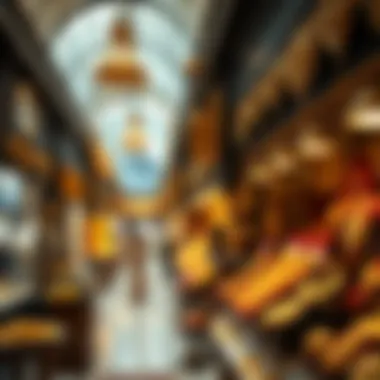

Intro
Dubai is more than just a dazzling skyline and luxury cars; it's a tapestry woven from vibrant culture and bustling commerce. The markets, or souks, reveal a side of the city often overlooked by those who dash between skyscrapers. These lively venues not only showcase the rich heritage of Dubai but also underpin the local economy, drawing residents and tourists alike. In this comprehensive guide, we journey through the eclectic mix of traditional and modern marketplaces that define Dubai's commercial landscape.
From the famous Gold Souk, shimmering with the brilliance of precious metals, to the charming alleys of the Spice Souk, the offerings are as diverse as the people who populate them. This exploration goes way beyond mere shopping; it’s about understanding how these markets reflect the culture and history of the region, all while adapting to contemporary trends.
The essence of the markets' appeal lies in their ability to create a sensory experience: the scent of spices wafting through the air, the vibrant colors of textiles, and the sound of bargaining echoing through the lanes. Each market has its own unique characteristics, drawing in various crowds for different reasons. In this guide, we will shine a light on their economic impact, consumer behaviors, and the challenges vendors face.
As the commerce scene in Dubai evolves, understanding these markets becomes pivotal not only for shoppers but also for investors, buyers, and developers looking for new opportunities. Let’s dive right in and explore what makes Dubai's markets the lifeblood of the city.
Prologue to Dubai's Marketplace Landscape
The bustling markets of Dubai are more than just places to buy and sell goods; they are a living testament to the city's history, culture, and economic vitality. As a critical hub of trade in the Middle East, Dubai’s marketplace landscape offers insights into the region’s traditions and shifting consumer behaviors. From the ancient souks teeming with spices and textiles to the modern malls showcasing luxury brands, the market scene captivates both local residents and international visitors alike.
Understanding Dubai's marketplace is essential for investors, buyers, developers, and all those engaging with the city's commercial ecosystem. It provides a window into consumer preferences, cultural exchanges, and economic trends. Furthermore, it sheds light on how these markets adapt to challenges and opportunities, especially given the evolving nature of retail in the age of technology.
At the heart of this exploration lies the significant role these markets play in shaping Dubai’s identity and economy. Taking a closer look at their historical roots, one finds a vibrant tapestry woven with diverse cultural influences that reflect the city's rapid growth and modernization. Thus, a comprehensive understanding of this landscape reveals not just trade practices but also the sociocultural fabric that binds the city.
Historical Context of Markets in Dubai
The roots of Dubai's markets extend deep into its history. The city, originally a modest fishing and pearling village, began to flourish as a trading port by the early 19th century. Merchants from various corners of the world set up shop, trading everything from spices to textiles and gold. This influx of commerce laid the groundwork for the bustling market scene we see today.
Back in the day, the lack of formal markets led to informal trading spots emerging along the Dubai creek. With the establishment of customs duties in 1901, the government facilitated an organized trading environment, paving the way for market development. The introduction of the Gold Souk in the 1940s marked a significant milestone, as it attracted traders from across the region and beyond, making it a central hub for gold trading.
Today, these historic markets hold untold stories of resilience and adaptability. They remind us that while Dubai has transformed into a megacity, its marketplace roots remain vital to understanding its current dynamics.
Cultural Importance of Markets
Markets in Dubai are not just about economic exchanges; they embody the city’s cultural essence. They serve as vibrant spaces where diverse nationalities and cultures converge, fostering interactions that go beyond mere transactions. The social significance of these markets should not be understated; they act as community gathering spots that reflect the eclectic mix of traditions and lifestyles.
Traditionally, souks like the Spice Souk and Textile Souk have played crucial roles in local customs, such as bargaining and communal shopping experiences, which are integral components of the Arab culture. Visitors can find locals and tourists alike haggling over prices, sharing tales, and negotiating deals, which adds layers of richness to the marketplace experience.
Moreover, markets serve as an educational platform for cultural exchange, where one can discover the history behind various goods, such as traditional handicrafts and locally sourced produce. This immersion into local culture helps ensure that traditions are passed down through generations, fostering a sense of community pride and belonging.
In essence, the markets of Dubai encapsulate the spirit of the city: a dynamic blend of the old and the new, while remaining a cornerstone of its social and cultural landscape.
These vibrant hubs of trade not only reflect economic activity but also serve as a bridge connecting the past with the present, showcasing Dubai's ongoing evolution in a globalized world.
Iconic Markets of Dubai
Exploring the iconic markets of Dubai is like navigating through a treasure chest filled with cultural gems. These markets not only showcase the rich traditions of the Emirate but also serve as hubs for trade and social interaction. They draw not just tourists but also locals, all enticed by the unique aromas, textures, and shimmering displays that these establishments have to offer. Each market holds a distinct character, contributing to Dubai’s diverse marketplace landscape. A thorough understanding of these vibrant souks is essential for investors, buyers, and developers looking to leverage the city's commercial potential.
The Gold Souk: A Dazzling Experience
The Gold Souk stands tall as a symbol of Dubai's trading prowess and is often hailed as the paradise for jewelry lovers. Situated in the historic district, this market is a labyrinth of narrow alleys filled with over 300 retailers offering everything from magnificent gold pieces to intricate diamond-studded creations. The atmosphere is charged with excitement; the golden glow radiates a charm that is hard to resist.
Visitors can find traditional pieces like intricately designed bangles and necklaces, but new trends also make an appearance. One notable aspect of the Gold Souk is how it functions like a social space. Bargaining is not just welcomed; it is expected.
"In Dubai's Gold Souk, the art of negotiation can sometimes yield prices that even seasoned investors would marvel at."
The significance of this market is also evident in how it impacts Dubai's economy. Gold trading here is a vital contributor to the local economy, and the ongoing business fosters job creation. It is a place where commerce meets tradition, attracting both seasoned buyers and new arrivals alike.
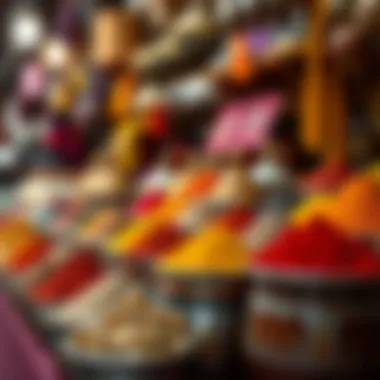
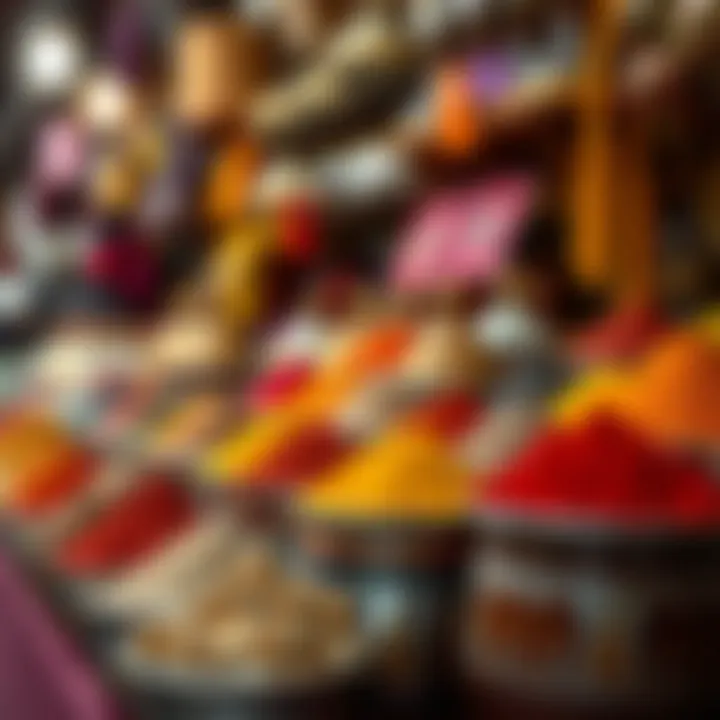
Spice Souk: Aromas and Flavors
Wandering through the narrow lanes of the Spice Souk is an olfactory adventure you won't want to miss. From vibrant saffron to aromatic cardamom, the air is thick with the scents of a thousand spices. This market captures the essence of not just culinary delights but global trade. Merchants here offer a wide selection of spices, dried fruits, and herbs, each telling a story rooted in history.
The vibrant colors and myriad textures create a sensual experience that engages the senses. Not only can customers purchase spices in bulk, but they can also engage in conversations with knowledgeable vendors who share recipes and cooking techniques, enriching the entire shopping experience. Some stalls specialize in unique spice blends, perfect for those looking to recreate an authentic Middle Eastern meal.
A visit to the Spice Souk offers valuable insights into local culinary traditions, thus encapsulating another layer of Dubai's rich cultural tapestry.
Textile Souk: A Fabric Wonderland
Nestled nearby is the Textile Souk, a visual feast for those with an eye for design and craftsmanship. Bathed in the vibrant hues of silk, cotton, and chiffon, this market showcases textiles from all over the world. From intricate Indian saris to luxurious Emirati garments, the variety is astonishing.
Shoppers can find everything from high-end fabrics to more affordable options, catering to various budgets. The weaving of stories and cultures in this market is palpable; each piece holds a unique narrative.
The Textile Souk is also a great opportunity for attendees to meet talented tailors who can craft bespoke items tailored to individual preferences. It's a vital spot for fashion enthusiasts and provides a glimpse into the robust textile trade that flourishes in Dubai.
Thus, a trip to Dubai's markets is not simply a shopping trip; it is an exploration of heritage, craftsmanship, and community spirit that shapes the city and its economy.
Modern Retail Spaces in Dubai
As one of the world’s most dynamic cities, Dubai boasts a retail landscape that is as varied as it is vibrant. Among the bustling markets and traditional souks, modern retail spaces have emerged as significant players, shaping shopping habits and transforming consumer experiences. Understanding the role these spaces play is key to appreciating the broad spectrum of Dubai's commercial appeal. Modern retail centers not only provide a wide variety of goods and services, they also serve as social hubs, blending luxury shopping with entertainment, dining, and leisure.
Malls vs. Traditional Markets
The ongoing tussle between malls and traditional markets in Dubai is both fascinating and illustrative of changing consumer behaviors. Traditional markets, such as the Spice Souk and the Gold Souk, are steeped in history and cultural charm. They offer a sensory overload of vivid colors, inviting aromas, and bustling crowds. Shoppers, often haggling prices, create a lively atmosphere that reflects the spirit of the city.
On the flip side, modern malls like the Dubai Mall and Mall of the Emirates present a different shopping experience altogether. They boast air-conditioned comfort, recognized international brands, and amenities like cinemas, fine dining, and even indoor ski slopes.
While traditional markets thrive on their authenticity and unique offerings, malls cater to convenience and luxury. Many residents and tourists find themselves oscillating between these two worlds, drawn to the charm of the souks for some unique finds and the ease of malls for regular shopping. Identity as a shopper in Dubai often involves navigating both realms, making the experience rich and diverse.
The Role of Mega Malls in Dubai's Economy
Mega malls are more than just places to shop; they are economic engines driving growth in Dubai. With attractions that go beyond retail—such as entertainment centers, themed attractions, and culinary experiences—they contribute significantly to the local economy. The influx of tourists seeking the unique combination of lifestyle and leisure that these malls provide generates revenue that supports various sectors.
Key contributions of mega malls to the economy include:
- Job Creation: These retail giants offer countless employment opportunities, not only in retail jobs but also in management, marketing, and logistics.
- Tourism Attraction: Dreaming of shopping in the world's largest mall? Tourists flock to Dubai, knowing they can experience iconic venues like the Burj Khalifa alongside their shopping ventures.
- Retail Innovation: Malls often act as testing grounds for new retail concepts, showcasing global brands seeking a foothold in the Middle Eastern market. This continual evolution keeps Dubai at the forefront of global shopping trends.
- Local Business Support: While mega malls host international chains, they also feature local brands, which helps to support and elevate the local economy.
From an investor's standpoint, understanding these dynamics is crucial. As retail continues to evolve, offering unique shopping experiences becomes paramount to satisfying ever-changing consumer preferences. Traditional markets and mega malls, each with distinct offerings, create a tapestry that enhances Dubai's commercial landscape. Thus, navigating this landscape is essential for anyone looking to engage in the vibrant markets of this remarkable city.
Consumer Behavior in Dubai Markets
Understanding consumer behavior in Dubai’s markets is crucial. The blend of local culture and the global influences defines how shoppers interact with both traditional souks and modern malls. This section breaks down some specific aspects of shopping habits and their implications on Dubai's marketplace landscape.
Shopping Patterns and Preferences
Dubai’s consumers have unique patterns when it comes to shopping. Observing these can provide valuable insights for potential investors and market developers.
- Luxury vs. Everyday Items: Consumers tend to favor luxury and branded goods, especially in malls like The Dubai Mall, where international brands thrive. Conversely, in traditional markets like the Spice Souk, everyday items and local products take center stage. This duality showcases how both realms cater to different needs.
- Shopping Experience: The atmosphere plays a pivotal role. Shoppers often enjoy the experience of haggling over prices in souks while seeking the convenience of one-stop shops in mega malls. The ambiance created in each market, be it the vibrant colors of the Spice Souk or the sleek designs of modern retail spaces, significantly impacts purchasing decisions.
- Cultural Influence: Local culture greatly shapes preferences. For instance, during Ramadan, there’s an upsurge in buying food items to prepare for Iftar. Further, the recent trend toward sustainable and organic products has gained traction, catering to a more conscientious consumer base.
- Online Integration: Another layer is added by online shopping. Consumers are increasingly using e-commerce platforms to browse products before visiting physical locations. This behavior shifts the traditional shopping patterns, prompting vendors to adapt their offerings and marketing strategies.
Impact of Tourism on Market Dynamics
Tourism in Dubai influences consumer behavior profoundly. Each influx of visitors creates a ripple effect in market dynamics.
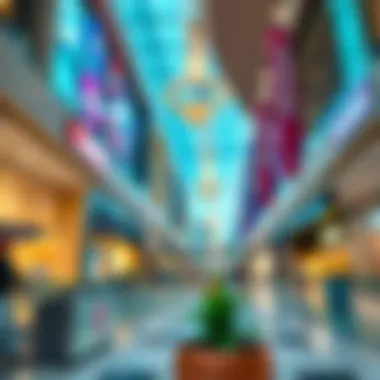
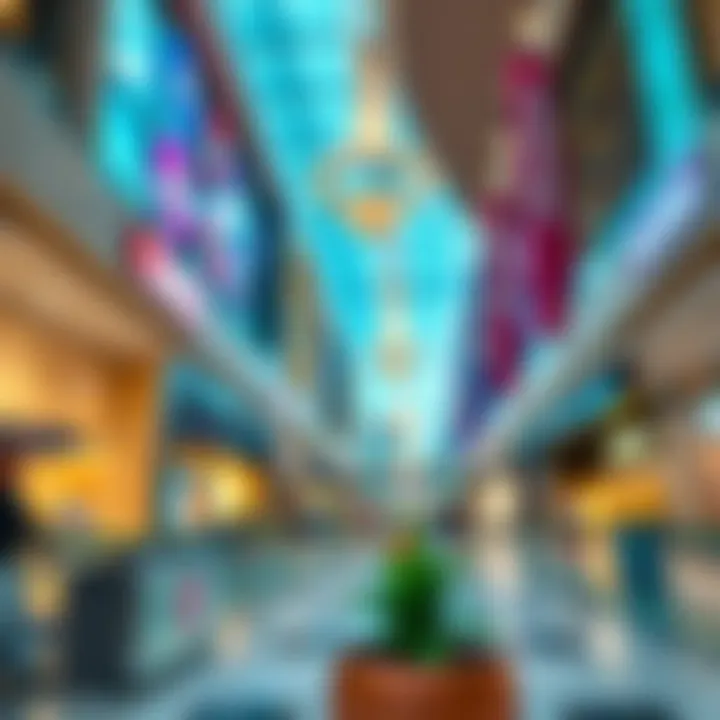
"Tourists make up a significant portion of shoppers in Dubai, affecting not just sales, but also product offerings."
- Seasonality and Promotions: Tourists usually flock to Dubai during certain seasons, notably winter holidays and the Dubai Shopping Festival. Vendors often design tailored promotions during these peak periods to attract more customers. Local markets and modern malls alike prepare for this seasonal surge, diversifying their inventory to include items that appeal to visitors.
- Cultural Exchange: Visitors interact with local culture, leading to greater interest in traditional crafts, spices, and gold, encouraging local vendors to capitalize on this interest. The resulting cultural exchange enriches the shopping experience, as tourists often seek authentic souvenirs that reflect their experiences in Dubai.
- Economic Contribution: The tourism sector significantly impacts local economies, particularly through retail sales. Market vendors have to adapt quickly to meet the diverse demands of both locals and tourists, ensuring that their products resonate across different tastes and preferences.
In summary, understanding the consumer behavior in Dubai's markets offers critical insights into how various factors interplay to shape shopping experiences. This knowledge is essential for anyone looking to invest or engage in the marketing industry in this bustling city.
Economic Impact of Dubai's Markets
The bustling marketplaces in Dubai do more than just showcase an array of goods; they are essential to the city's economic vitality. As a melting pot of cultures and commerce, these markets embody Dubai's historical and contemporary identity. They have a significant role in generating revenue and offer insights into the unique dynamics of trade within a rapidly evolving urban landscape.
Contribution to Local Economy
Dubai's markets contribute massively to the local economy. With their eclectic mix of products—from spices to textiles—the markets serve both high-end clientele and everyday shoppers. Consider this: in the Gold Souk, the sale of gold and jewelry alone accounts for millions of dirhams each year, drawing local and international visitors alike. This influx of tourists not only boosts sales, but also stimulates related industries, such as hospitality and transportation.
- Increased Revenue: Traditional markets, despite modern competition, generate formidable revenue through direct sales and rentals.
- Cultural Tourism: Tourists flock to experience not just shopping, but also cultural interactions, providing an additional layer of economic benefit.
The markets distinctly reflect the essence of Dubai—a thriving economy manifested through intricate textiles and artisanal wares. This nexus of culture and commerce ensures that money cycles through local businesses, preserving the interconnectedness of community and economy.
Employment Opportunities Within Markets
Job creation is another formidable impact of Dubai's marketplaces. The sheer volume of people navigating the stalls and shops leads to numerous employment opportunities. From shopkeepers to craftspersons, not to mention logistics and seasonal workers, the markets are thriving hubs for job seekers.
- Diverse Workforce: These markets employ a mix of cultures and backgrounds, making it a microcosm of Dubai itself. Workers range from local artisans to expatriates, each contributing to the economy.
- Training Programs: Many markets initiate training programs to equip prospective employees with necessary skills. This not only sharpens their competitive edge but also fosters community spirit.
The markets may very well be the heart of Dubai's economy, pumping vitality throughout various sectors. They provide an essential source of livelihood, come rain or shine. As they continue to adapt to modern economic realities while preserving their rich heritage, these marketplaces will likely remain a cornerstone of Dubai's commercial identity.
"Markets are not just places where goods are traded; they are vibrant communities where culture, economy, and tradition intersect."
In summary, the economic implications of the markets in Dubai extend beyond mere transactions. By fostering local employment and driving significant revenue, these markets present a compelling case for continued investment and development in the region's unique commercial landscape.
For more details about Dubai's expanding economic framework, explore resources such as Wikipedia and Britannica.
Challenges Faced by Market Vendors
In the ever-bustling landscape of Dubai's markets, vendors face a myriad of challenges that can impact their livelihood and operational success. These obstacles go beyond simple market fluctuations; they intertwine with broader shifts in consumer behavior, particularly influenced by the advent of technology. Understanding these challenges is crucial for investors, buyers, developers, agents, and professionals who engage with or rely on the vibrant ecosystem that defines Dubai's commercial scene.
Competition from E-commerce
With the rise of e-commerce, local market vendors find themselves in a fierce battle for consumers’ attention and wallet. The convenience of shopping online, which often boasts a wider range of products at competitive prices, has captivated many shoppers. This shift has left many market sellers scrambling to maintain their foot traffic. From traditional Souk vendors to those in modern malls, the impact is palpable.
- Price Sensitivity: Online platforms frequently offer discounts and promotions that local vendors cannot match. Many shoppers now base purchasing decisions on price alone, making it hard for small businesses to compete.
- Convenience Factor: Consumers are drawn to the ease of shopping from their devices, opting to browse and buy from the comfort of their homes rather than navigating crowded markets or busy street vendors.
- Marketing and Visibility: E-commerce platforms like Amazon or local options such as noon.com deploy sophisticated marketing strategies. They use targeted ads, user reviews, and personalized shopping experiences that can dwarf the visibility of smaller, traditional vendors.
"The change in customers’ shopping habits poses an existential threat to traditional markets in Dubai. Vendors need to adapt or risk being left behind."
In this reality, some vendors have started to incorporate online sales into their business strategy, creating their own websites or utilizing social media as a sales channel. This adaptation might be a lifeline, but it requires investment and know-how that every vendor might not possess.
Regulatory Hurdles
Navigating the regulatory landscape in Dubai can be a daunting task for market vendors. Set against the backdrop of rapid economic development, the rules and regulations governing markets have been put in place to maintain a fair and orderly trading environment. While necessary, these regulations can sometimes feel like stumbling blocks for market players.
- Licensing and Permits: Obtaining the right licenses and permits can be a lengthy and intricate process. Vendors need to ensure they comply with the local laws, which can change unexpectedly, leading to confusion and potential fines if not adhered to.
- Operational Limitations: There may be restrictions on hours of operation, types of goods that can be sold, or even limits on pricing strategies. For vendors looking to innovate or run their businesses with flexibility, this can feel stifling.
- Health and Safety Standards: Particularly for those selling food products, adhering to health regulations is non-negotiable but can be costly and complex. Meeting safety standards often requires significant investment in infrastructure and training, which can be especially burdensome for smaller vendors.
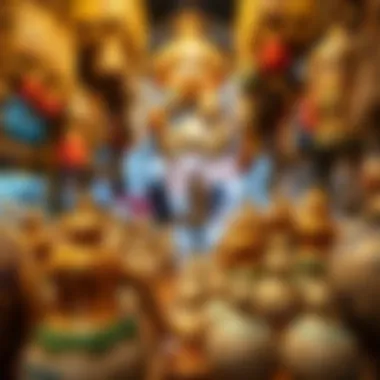
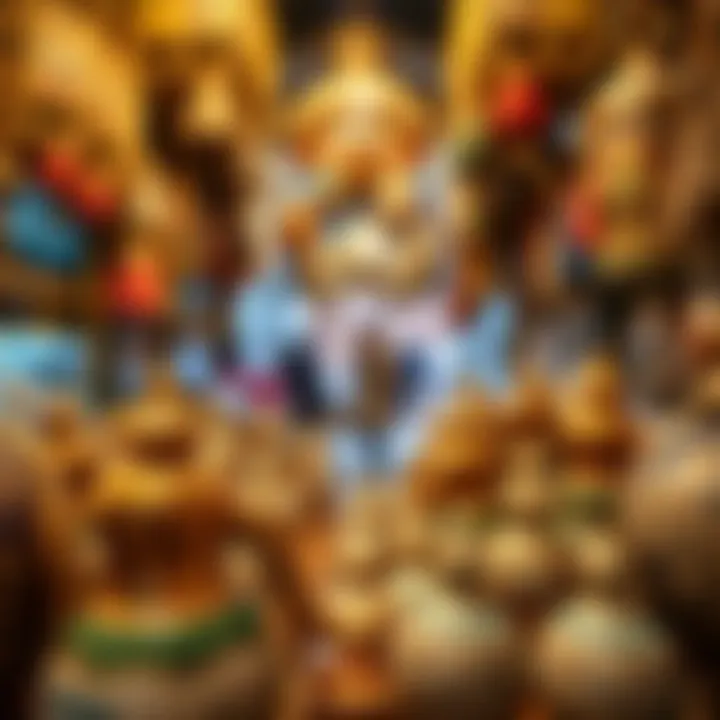
As Dubai continues to grow and attract a global market, understanding how to maneuver within these regulatory requirements will be crucial for vendors seeking long-term success. Adaptability and knowledge will be key as they strive to overcome these hurdles while keeping the heart of Dubai's markets beating strong.
Innovations in Market Practices
The hustle and bustle of Dubai’s markets is not just about vibrant displays of goods or the hum of bargaining voices. It’s also about how these marketplaces are evolving through innovative practices. In an age where technology drives consumer expectations, the markets of Dubai are adapting to stay relevant and appealing. The significance of innovations in market practices can be looked at from various angles, including customer engagement, efficiency improvements, and environmental considerations.
Adapting to Technological Advances
Technological advancement has seeped into every aspect of our daily lives. Similarly, Dubai's markets are embracing modern technology to enhance the shopping experience. Consider mobile payment systems, which have gained traction here. Traditional cash transactions are being replaced with seamless mobile wallets or digital banking options. Vendors are adapting to this change to cater to tech-savvy customers who prefer quick, cashless options.
Moreover, augmented reality is playing its part, too. Shoppers can use apps that overlay product information or reviews in real-time, guiding their purchasing decisions while they wander through the crowded aisles. Wouldn't it be fascinating to see a platform where you can catch a glimpse of how a piece of traditional desert art looks in your living room before buying it?
"Technology isn’t just changing the way we shop; it’s reshaping our entire market landscape."
Furthermore, online marketplaces are paving the way for traditional vendors. They facilitate orders in advance, allowing customers to pick up their items later. This blend of online convenience with in-person shopping upholds local culture while embracing modern trends.
Sustainable Practices in Market Operations
Sustainability is becoming a buzzword that can no longer be ignored, even in the vibrant markets of Dubai. There is a growing awareness among consumers regarding environmental responsibility. Many market vendors are stepping up, incorporating sustainable practices into their operations. For instance, using biodegradable packaging options or encouraging customers to bring their own bags has become more common.
An increasing number of vendors are also focusing on sourcing locally. This reduces the carbon footprint associated with transporting goods over long distances. Vendors are also investing in eco-friendly products, from organic spices to handmade crafts, appealing to the discerning customer who treasures both quality and sustainability.
Moreover, markets are starting to implement water conservation methods, particularly in areas where fresh produce is sold. For instance, drip irrigation systems are becoming widely adopted. These systems allow farmers to use water more efficiently, which is crucial in a desert environment like Dubai.
The drive for sustainability not only attracts environmentally-conscious consumers but also provides a competitive edge in the market landscape. As the global focus shifts towards sustainable living, adapting market practices to align with these values is a timely step towards a more responsible future for Dubai's bustling marketplaces.
Future of Markets in Dubai
As we glance forward into the ever-evolving landscape of Dubai’s markets, it becomes evident that change is not just on the horizon; it’s at the forefront. The future of these bustling marketplaces is significant for several reasons. Firstly, they embody the city’s cultural heritage, sustaining a tradition that is deeply embedded in the Emirati lifestyle. Secondly, they are pivotal in shaping economic trajectories, adapting to shifting consumer behaviors and technological advancements. The ongoing development in infrastructure, alongside significant investments by local authorities, indicates that these markets are set to thrive. Their ability to blend the old with the new will undoubtedly attract more residents and tourists.
Trends Shaping the Future Landscape
Looking at the future, several trends will inevitably impact Dubai's markets.
- Integration of Technology: With the rapid pace of technological innovation, markets are likely to embrace automation and digital solutions. This includes everything from online shopping platforms that complement physical presence to using augmented reality for immersive experiences.
- Focus on Experience: Modern consumers are not just after products; they seek experiences. This shift will encourage markets to create unique atmospheres, blending merchandise with local culture, entertainment, and gastronomy.
- Sustainability Measures: Environmental considerations are becoming paramount. Markets will likely implement sustainable practices, reducing waste and promoting local production to align with global trends towards eco-friendliness.
These elements help maintain Dubai's appeal and ensure that local and international shoppers continue to see value and attraction in its markets.
Potential Growth Areas
While Dubai flourishes in numerous sectors, some potential growth areas stand out within its market scene.
- Cultural Experiences: Further focusing on cultural events will enhance market attractiveness. Organizing art shows, food festivals, and traditional performances can enrich visitor experiences.
- Niche Markets: Opportunities exist in crafting specialized markets, such as those solely for artisanal goods or organic products, catering to particular consumer preferences.
- Collaborative Spaces: The idea of markets as hubs for entrepreneurship can be further explored. Co-working spaces combined with retail can spark innovation and collaboration, providing ample opportunities for both new ventures and established businesses.
Closure: The Significance of Dubai's Markets
Dubai's markets, ranging from the traditional souks to the modern mega malls, form a vital tapestry that weaves together the city’s economic, cultural, and social fabric. The importance of these marketplaces cannot be overstated, as they epitomize the unique blend of heritage and modernity that characterizes the emirate.
Firstly, the markets serve as a hub for economic activity. They create jobs and stimulate local businesses, significantly contributing to the overall economy of Dubai. Traditional markets, like the Spice and Gold Souks, attract not only residents but also tourists from all over the world who come to experience the authentic trading culture. Such influx strengthens the city’s financial standing, making it a key player on the global stage.
Moreover, these markets embody cultural significance. The act of bargaining and the communal atmosphere provide a sense of connection to the past. They maintain the traditions of trade even in an era of e-commerce dominance. This is particularly important for preserving the identity of the local community, giving both residents and visitors a glimpse into the heritage of the UAE.
The unique offerings found in these markets add another layer to their importance. Products from spices to textiles carry stories that resonate with the cultural narratives of the region. This not only makes for a richer shopping experience but also elevates the understanding of cultural diversity within Dubai.
In summary, the significance of Dubai's markets lies in their multifaceted roles as centers of economic growth, cultural preservation, and unique consumer experiences. As the city continues to evolve, these markets remain a cornerstone that balances the old with the new, making them indispensable to both the locals and those who visit.
“Dubai's markets are not just places of commerce; they are reflections of its rich cultural heritage and community spirit.”
For further insights, resources on Dubai’s economic landscapes can be found at Encyclopedia Britannica and promotional materials from the Dubai Department of Economic Development.



